SWEDISH SOUTH ASIAN STUDIES NETWORK
Visit to the University of Mumbai,
November 19-21, 2007
Web page: http://www.mu.ac.in/
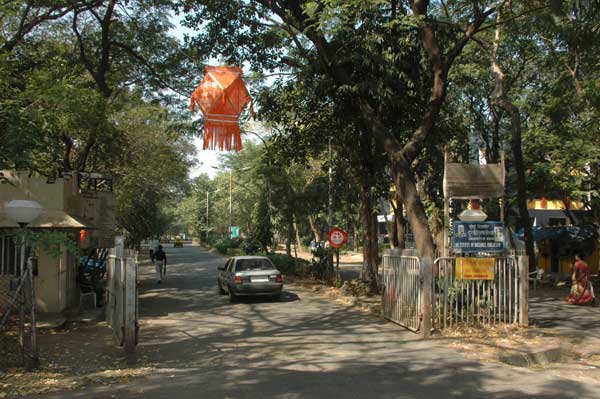 The University of Mumbai is one of the largest in India, with more than 50,000 students, 500 affiliated colleges throughout Maharashtra, 110 institutes, and 55 departments. It was established in 1857, being amongst the first three Universities in India. As a sequel to the change in the name of the city from Bombay to Mumbai, the name of the University was changed from ”University of Bombay” to ”University of Mumbai” in 1996.
The University of Mumbai is one of the largest in India, with more than 50,000 students, 500 affiliated colleges throughout Maharashtra, 110 institutes, and 55 departments. It was established in 1857, being amongst the first three Universities in India. As a sequel to the change in the name of the city from Bombay to Mumbai, the name of the University was changed from ”University of Bombay” to ”University of Mumbai” in 1996.
Initially, the University concentrated its efforts on controlling teaching at the undergraduate level and in conducting examinations. Later on it took up research and the task of imparting instructions at the Post-Graduate level. This resulted in the establishment of the University Departments beginning with the School of Sociology and Civics & Politics.
We spent a few days at the University Guest House inside the main Kalina campus in Vidyanagari, Santa Cruz East, housing much of the social sciences and behavioural sciences departments. (The original university campus is located downtown in the Fort area, near the southern end of the city. It houses the administrative division of the university, being built in the Gothic style of architecture and also including a library which holds many original manuscripts.)
Meetings at the Department of Civics and Politics
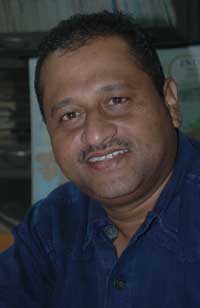 |
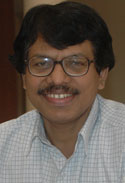 |
| Rajesh Kharat and Jose George. | |
Web page: http://www.mu.ac.in/arts/social_science/
Civics_Politics/DeptofArts_Civics_Politics.htm
Our chief contact, Dr. Rajesh Kharat, Reader in the the Department of Civics and Politics, with his research focusing on international relations, had planned our programme, but unfortunately he had to leave for urgent matters in Delhi and could therefore not participate in the meeting organised at his own department on Monday 19 November. The department is housed in a beutiful new building called Sir Pherozeshah Mehta Bhaban.
Instead we had a fruitful discussion with the Head of the department, Dr. Jose George, Professor of Public Administration, who arranged for us to meet with seven of the twelve faculty members in his department.
The Department of Civics and Politics offers courses at the level of M.A., M.Phil., and Ph.D., as well as post diploma courses in Human Rights. Dr. George told us that the university now is in the process of changing to a two-semester system and the various departments will now be given a higher degree of freedom to create their own syllabi.
After we gave our presentation about SASNET, those in attendance introduced their research areas to us.
| Name: | Research area: |
| Dr. Jose George | Local government, Panchayat raj, agrarian movement, public administration |
| Dr. Kannamma Raman | Health and pharmaceutical policy, human rights, trafficking, on-line teaching. |
| PhD candidate Arinash Khandare | Political socialization and identity. |
| PhD candidate Sneha Shete | Political parties, human rights, and social thinkers |
| Professor B.N. Mehrish | International relations, peace research and conflict resolutions, international law |
| Dr. Anina Pendse | Social movements, urban politics, Indian politics |
| Dr. Sudha Mohan | Civil society, sustainable development, globalization |
| Dr. Uttara Sahasrabuddhe | IR theory, Indian foreign policy |
Two days later, on Wednesday 21 November, we met again at the Department of Civics and Politics. We were invited for a session with Dr. Surendra Jondhale and fifteen of his students, at which Anna presented a lecture on her research in Kerala, based on her 2001 PhD thesis ”Experience and Identity: A Historical Account of Class, Caste, and Gender among the Cashew Workers of Kerala, 1930-2000” (more information).
History of Department, and Board of College and University Development
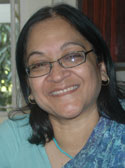 During our stay at the University of Mumbai, we also visited the Department of History and met with the Head of the department, Dr. Ruby Maloni (photo to the right). The department has approximately 200 students studying for their M.A., M.Phil., or Ph.D.. They collaborate with Leiden University in the Netherlands, where several faculty members have spent time. The department has also received foreign scholars, mainly through the Fulbright programme in India. Dr. Maloni pointed to one area in which Swedish and Indian historians would have a common interest, viz., commerce and trade between India and Sweden.
During our stay at the University of Mumbai, we also visited the Department of History and met with the Head of the department, Dr. Ruby Maloni (photo to the right). The department has approximately 200 students studying for their M.A., M.Phil., or Ph.D.. They collaborate with Leiden University in the Netherlands, where several faculty members have spent time. The department has also received foreign scholars, mainly through the Fulbright programme in India. Dr. Maloni pointed to one area in which Swedish and Indian historians would have a common interest, viz., commerce and trade between India and Sweden.
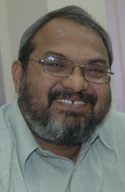 On the last day in Mumbai (Wednesday 23 November), we also met with the Director of the Board of College and University Development, Dr. V. N. Magare (photo to the left), a close associate to to the University of Mumbai Vice Chancellor Dr. Vijay Khole (whom we unfortunately were not able to meet). Dr. Magare and the rest of the university administration was temporarily accommodated in the Dr. Babasaheb Ambedkar Bhawan at the Kalina Campus, since the main university building (Convocation Hall) in the Fort Campus was under renovation.
On the last day in Mumbai (Wednesday 23 November), we also met with the Director of the Board of College and University Development, Dr. V. N. Magare (photo to the left), a close associate to to the University of Mumbai Vice Chancellor Dr. Vijay Khole (whom we unfortunately were not able to meet). Dr. Magare and the rest of the university administration was temporarily accommodated in the Dr. Babasaheb Ambedkar Bhawan at the Kalina Campus, since the main university building (Convocation Hall) in the Fort Campus was under renovation.
After our presentation about SASNET, he told us about ongoing collaboration with foreign universities in Brazil, South Africa, and the UK (Westminster University).
Dr. Magare pointed out that the structure of the University of Mumbai has been the cause of some bureaucratic problems, but ongoing changes will facilitate cooperation in the future. Dr. Magare said the university is very interested in all kinds of collaboration, particularly in areas that are multidisciplinary and have a holistic approach.
SASNET - Swedish South Asian Studies Network/Lund
University
Address: Scheelevägen 15 D, SE-223 70 Lund, Sweden
Phone: +46 46 222 73 40
Webmaster: Lars Eklund
Last updated
2008-12-15
